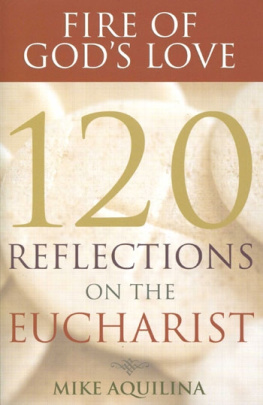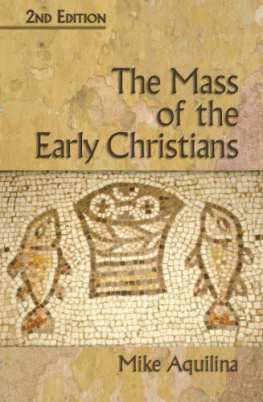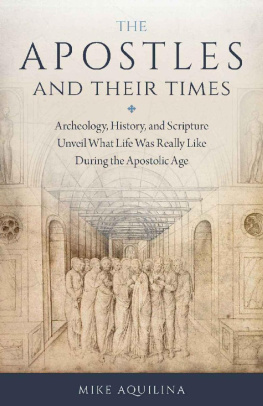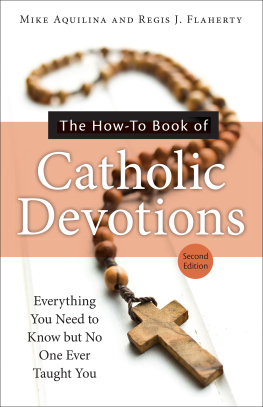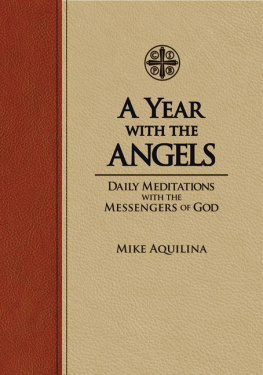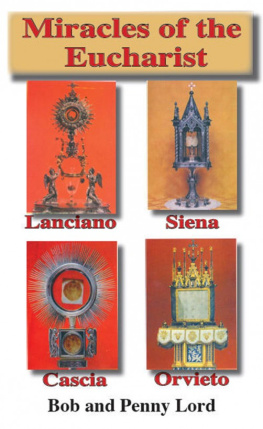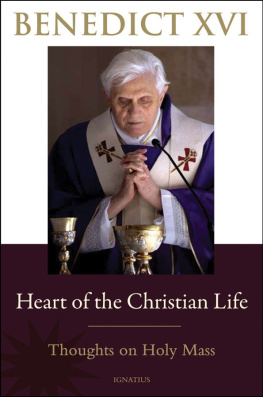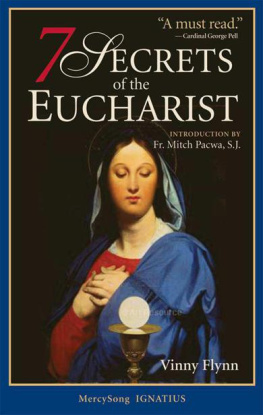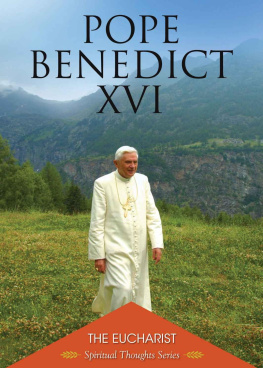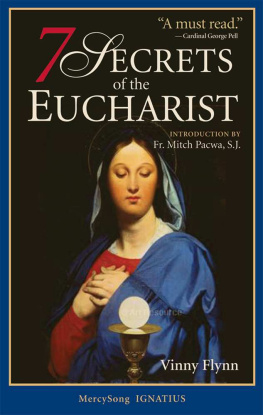FIRE OF GOD'S LOVE
Reflections on the Eucharist
MIKE AQUILINA

Cover and bookdesign by Mark Sullivan
Cover image istockphoto.com/John Rodriguez
Library ofCongress Cataloging-in-Publication Data
Fire of God's love: 120 reflections on the Eucharist / compiled and introduced by Mike Aquilina.p. cm.
Includesbibliographical references and index. ISBN 978-0-86716-923-2 (pbk.: alk. paper)1. Lord's SupperCatholic ChurchMeditations. I. Aquilina, Mike. BX2235.F572009 264'.02036dc22
2009017270
Copyright 2009,Mike Aquilina.
ISBN978-0-86716-923-2
Published byServant Books, an imprint of St. Anthony Messenger Press.
28 W.Liberty St.Cincinnati, OH 45202
www.ServantBooks.org
Printed in theUnited States of America.
For ScottHahn, friend and table companion, and always standing by (see Sirach 6:8-10)
CONTENTS
Introduction
The Christian mysteries exceed the capacities of humanreason. We could never have discerned these truths if God had not revealed themto us. Ordinary language cannot do them justice. They strain even thespecialized vocabularies of the sciences, such as philosophy and theology. Theytrespass far beyond the frontiers of poetry.
How then can we begin to speak of them?
Sciences falter and poetry fails, but love succeeds bygrace. The love of Jesus impels the saints to awestruck silence but also toimpassioned speech.
It is Jesus whom the saints know in the Eucharist, thesacrament of the altar. There he is present, Body, Blood, soul and divinity.Under the appearance of a small bit of bread, a drop of wine, God abides in hisentirety. The finite contains all infinity, drawing us into communion, makingus like himself, sharing his divine nature as generously as once he took up ourhuman nature.
That infinite love is the power behind the words of thesaints, the words of Catholics ancient and modern that appear in this book. TheEucharist inspired them to extend the range of science and art, to elevatehuman words beyond their ordinary reach, to raise them to heaven, as theEucharist raises the Church even now.
The Eucharist empowers Christians to build up new cultureson the ruins of the old ones. The Jewish historian Miri Rubin has demonstratedhow the Church's profound belief in the real presence inspired the great achievements of the Middle Ages:the development of hospitals and universities, hospices and hostels. As the oldRoman "culture of death" crumbled, Christians were able to build acivilization of love.
That civilization may have blossomed in the MiddleAges, but it was foreseen in the ancient Church. A third-century manual ofChurch discipline directs, "Widows and orphans are to be revered like thealtar." Such a command envisions a social life based on a network ofcharity, but it presumes a deep eucharistic piety.
Theeucharistic kingdom of Christ has arrived, for Jesus reigns in the sacrament.But Saint John Chrysostom urged his fourth-century congregations to hasten theday when that reality was no longer invisible but abundantly evident everywherein city streets andbeside rural roadways. Preaching on the Gospel of Matthew, he said,
Do youwish to honour the body of Christ? Do not ignore him when he is naked. Do notpay him homage in the temple clad in silk only then to neglect him outsidewhere he suffers cold and nakedness. He who said: "This is my body"is the same One who said: "You saw me hungry and you gave me nofood", and "Whatever you did to the least of my brothers you did alsoto me"... What good is it if the Eucharistic table is overloaded withgolden chalices, when he is dying of hunger? Start by satisfying his hunger, andthen with what is left you may adorn the altar as well.
Through the Eucharist God changes us as surely as hechanged the elements of bread and wine into himself. He forms us as livingstones in the temple of his Church. He builds up a eucharistic culture toreplace the culture of death.
Think globally? Act eucharistically. It's the sacramentthat renews the earth.
Asking what you can do for your country? Make a goodCommunion. Make a visit to the tabernacle. Much more will follow.
God will make limitless poetry out of the prose of yourlife, and he will renew the face of the earth, beginning with your littlecorner.
The Quotes
The SpiritualShortcut
Holy Communion is the shortest and surest way toHeaven. There are others, innocence, for instance, but that is for littlechildren; penance, but we are afraid of it; generous endurance of the trials oflife, but when they come we weep and ask to be spared. Once and for all,beloved children, the surest, easiest, shortest way is by the Eucharist. It isso easy to approach the holy table, and there we taste the joys of Paradise.
Pope Saint Pius X
The Greatest Work byFar
Put all the good works in the world against onecommunion well made, and they are like a speck of dust beside a mountain.
Saint John Vianney
LetterFrom a Saint
I was overjoyed to hear that you are going toexperience the precious joy of receiving First Communion on the ninth of June.My dear little brother, it goes without saying that from this moment on, yourheart, your spirit and your soul should be occupied with one thought alone:preparing your heart to be God's dwelling place. Oh, yes! Our good Savior mustcontinually be present in your thoughts and you must pray to him to prepare hisdwelling place himself so nothing is lacking when he arrives. The angels envyyour happiness already, they who possess this God three times holy. They singhis praises without ceasing, but they cannot receive him as we do. How goodJesus is to humble himself to give himself to us and to make of our poor heartshis dwelling place. Invoke the Most Holy Virgin, my dear little friend. Ask herto grant you all the graces you need for this great act.
Saint Bemadette Soubirous
The Real Wonder
The Hostthat is raised up is the Body of the Living Christ.
The Chalice that is lifted up contains His Blood.
This Mystery has sometimes been accompanied by visiblemiracles, seen not only by holy persons, who were assisting at Mass with greatfaith; but even by people of little fervour, or by absolute unbelievers.
Once a holy hermit saw the Child Jesus in the Host, andthe vision at the Elevation radiated a marvellous light. Once, too, it happenedthat a rather awkward priest upset the chalice, in which the wine was alreadyconsecrated, and spilled it on the altar cloth. The wine, which was white, leftred stains like blood, and although the cloth was washed and washed over againthe stains could not be removed.
The story is also told ofWittikind, the fierce King of the Saxons, who was converted to Christianitybecause he saw in the Host at the Elevation the face of a little boy smiling athim ...
But the real wonder is worked sacramentally by Christ'scoming into the hearts of Christians. The greatest wonder of all is what takesplace at every Mass: the real presence of Jesus, hidden from our eyes, buttruly present to our faith.
Jesus remains, thus hidden under the appearance of theSacrament, which is kept in the locked Tabernacle. So every time a Catholicenters his church he bows down devoutly before Him.
The church is a holy place because of this RealPresence of Jesus.
Maria Montessori
Feeding the Masses
The only cure for sagging [or] fainting faith isCommunion. Though always Itself, perfect and complete and inviolate, theBlessed Sacrament does not operate completely and once for all in any of us.Like the act of Faith it must be continuous and grow by exercise. Frequency isof the highest effect. Seven times a week is more nourishing than seven timesat intervals. Also I can recommend this as an exercise (alas! only too easy tofind opportunity for): make your communion in circumstances that affront yourtaste. Choose a snuffling or gabbling priest or a proud and vulgar friar; and achurch full of the usual bourgeois crowd, ill-behaved childrenfrom those whoyell to those products of Catholic schools who the moment the tabernacle isopened sit back and yawnopen necked and dirty youths, women in trousers andoften with hair both unkempt and uncovered. Go to Communion with them (and prayfor them). It will be just the same (or better than that) as a mass saidbeautifully by a visibly holy man, and shared by a few devout and decorouspeople. (It could not be worse than the mess of the feeding of the FiveThousandafter which [Our] Lord propounded the feeding that was to come.)
Next page
